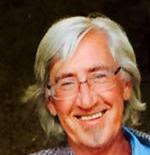Spent yesterday going to London to talk to a man who's interested in the possibility of making a television documentary based around my book - not as a biopic of McTell but centred on the people and places encountered when I was researching the book in Georgia. We'll just have to see how it goes.
The film-maker and I met to discuss it inside the British Library, and after our meeting I had a look around "Sacred", the special exhibition they have on at the moment, which is a comparative look at the Jewish, Christian and Muslim faiths, and especially the works created by them - sumptuously decorated bibles, for example, some of which were over a thousand years old. It was a special thrill for me to see yer actual Great Bible of 1539, edited by Coverdale (c.1488-1569), which I had cited and quoted from briefly in Song & Dance Man III.
After about half an hour, electronic shrieking sounded and everyone had to leave. No-one knew why. I phoned today to ask, and was told it was a test of the fire alarms. I have no complaint personally: I was ready to leave anyway, and had an umbrella with me, but it seems uncivilised - unBritishLibrary, indeed - that they chose to test the alarms while it was pouring with rain, thus forcing many in the enormous throng emerging from the building to get soaked as well as to abandon their work.
Subscribe to:
Post Comments (Atom)


2 comments:
It seems standards are slipping at the British Library. See below for an article from the Times:
"How British Library allowed 300-year-old diary to be ruined"
Dalya Alberge, Arts Correspondent
A historic diary written by a prominent Jacobite as he plotted the 1715 rebellion has been severely damaged while in the care of the British Library, The Times has learnt.
Its private owner, a descendant of Thomas Tyldesley, the diary’s author, has described how he “wanted to weep” when he collected the 96-page manuscript last week and discovered that someone had spilt oil across its pages – staining them and making some of them completely illegible. Its original leather front cover had also been cut off.
Peter J. Tyldesley, a solicitor and consultant for the Law Commission, said that a vital part of national history had been lost. In its original condition, the document would be likely to raise a high five-figure sum at auction. “There are sections which are completely destroyed, sections where the entire text block has disappeared into a smeary mess,” Mr Tyldesley said.
“In some ways, it’s so bad it’s difficult to imagine it was ever a diary. It’s been a truly shocking experience.”
Within the manuscript, Thomas Tyldesley (1657-1715) wrote daily diary entries for almost three years from March 25, 1712. He detailed everyday life and political events, as well as the plotting and the intrigue with which his family was involved in their pursuit of the Jacobite cause. As the rebellion of 1715 approached, he described how he had his gun and sword repaired and began to receive visitors of note – including one envoy who is recorded as arriving “in disgyes”.
The diary measures about 5½ inches wide and 14½ inches tall (14cm x 37cm). Ironically, Mr Tyldesley transferred it to the library in 1994 because he was nervous of looking after it. He told The Times: “I thought the British Library was the safest place for it. How wrong I was.”
The British Library told The Times that the diary had “suffered accidental damage”, but insisted that it was an “isolated incident”. Helen Shenton, the library’s head of collection care, said: “The book had been kept in safe storage in a protective box and it was not until the book was opened that the stains were discovered.”
She added: “We apologise for any distress caused to Peter Tyldesley.”
Family fortunes
—The diary, above, was kept by Thomas Tyldesley (1657-1715), who came from an old Lancashire family renowned for its loyalty to the Catholic cause
—His father, Edward, was 6 when he saw a priest seized from his family’s home and taken to Lancaster to be hanged, drawn and quartered
—With the Restoration, Edward formed part of the embassy that brought Catherine of Braganza to London for her marriage to Charles II
—This resurgence in the family’s fortunes was shortlived and ended with the departure of the last Catholic king, James II, to France in 1688
—Thomas Tyldesley, the diarist, had a secret chamber constructed in the family home – for James II, if he were to return
Thanks for writing. Appalling that this could happen. And that the BL's official response is so bland and casual.
Post a Comment